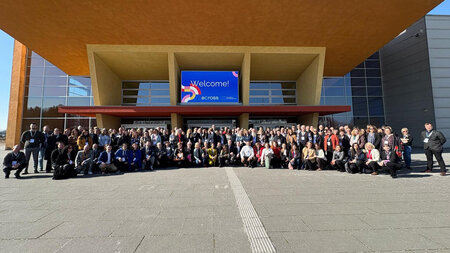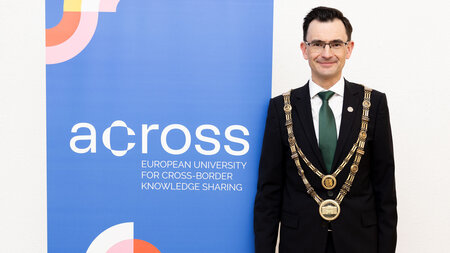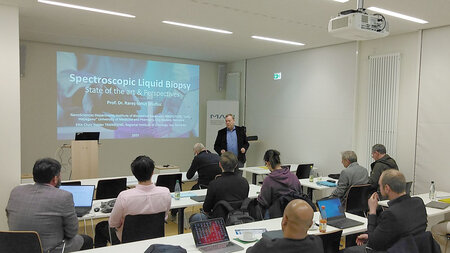From the Lab to the Real World: Technological Assistance for Dementia Patients
Electrical engineers at the TU Chemnitz hope to bring the laboratory-developed Smart Sensor Network into real world settings, to help support the care of people with dementia
-

Dr. Michel Findeisen from the Professorship of Digital Signal Processing and Circuit Technology introduces State Secretary Andrea Fischer to the experimental apartment at the TU Chemnitz, which has been outfitted with a sensor system. Photo: Mario Steinebach -

Prof. Dr. Gangolf Hirtz, Head of the Professorship of Digital Signal Processing and Circuit Technology, is handed the notice of funding by State Secretary Andrea Fischer. Photo: Mario Steinebach
Every person becomes increasingly forgetful as they age. However, the disease pattern of dementia is something entirely different, most notably characterized by a slowly progressing decline in mental ability. According to estimates from the World Health Organization (WHO) and Alzheimer’s Disease International, more than 44 million people worldwide are affected by dementia. This trend is on the rise. Demographic changes in Germany are anticipated to bring along higher rates of the disease, as the probability of developing dementia increases with age. According to the “BARMER GEK Pflegereport 2010”, one half of all women and one third of all men should expect to develop dementia in their lifetime. Today, 1.6 million individuals in Germany are diagnosed with dementia, according to the Federal Ministry of Health. The Deutsche Alzheimer Gesellschaft e.V. (German Alzieimer’s Society) estimates that the number of dementia patients will increase to 3 million by the year 2050, which means an increase of approximately 40,000 people per year. At the same time, there is a shortage of caregivers available to meet the increasing demand for dementia care.
In order for a dementia patient to remain in his home and still receive all necessary care, certain conditions must be created so he does not represent a danger to himself or others. Constant outpatient monitoring and supervision by caregivers is not financially feasible. Until now, this issue has resulted in the admission of dementia patients to inpatient care facilities, so that they can receive critical care as quickly as possible. With this in mind, the TU Chemnitz has begun working on the research project “AUXILIA User-Centered Assistance and Safety System for the Support of People with Dementia Based on Intelligent Behavior Analysis”. The project receives approximately 2.5 million euros in funding via the Saxon State Ministry of Social Affairs and Consumer Protection drawing from the European Regional Development Fund (EDRF) and state funding. State Secretary Andrea Fischer gave the Faculty of Electrical Engineering and Information Technology official notice of funding on July 26, 2016. Now, the Professorship of Digital Signal Processing and Circuit Technology, under the direction of Prof. Dr. Gangolf Hirtz, will work to develop solutions to allow dementia patients to live more independently and remain in their own homes longer.
Many of the technical approaches to supporting dementia patients have, until now, only been developed and tested in laboratory conditions. This project aims to put these concepts into practice within a robust, practical assistance system. Support provided will take on the following forms and functions: interactive reminder and mobility assistance; integration of a reliable emergency detection and direct alert system in case of dangerous situations; needs-based provision of information to family caretakers – for instance via smart phone or internet; information provision in risk situations and about the patient’s general condition; providing information to professional caregivers and automatic data capture for nursing records. “One central element of the system we are planning is an intelligent contactless sensor that will automatically analyze a person’s behavior,” says Hirtz. In their current work, researchers in Chemnitz draw on the results of the previous “OPDEMIVA” project. In addition, they have the support of several competent partners, including the Klinikum Chemnitz hospital system, the Heim gGmbH medical care company and the Professorship of Ergonomics and Innovation Management at the TU Chemnitz.
“The Free State of Saxony is counting on innovative ideas that will make life easier for older people,” said State Secretary Fischer. “In the future, intelligent systems will provide us with even more support in our daily lives. Many aging people today share a desire to remain in their homes even into old age. Just like GPS systems have become a part of everyday life for drivers today, in a few years, interactive technological assistants and contactless sensors could support and monitor older people in their day-to-day lives. Assistance systems like the ones developed by the TU Chemnitz are creating the necessary conditions for this and will provide relief to professional and family caregivers in a few years.” According to the Secretary, funding for the project reflects the Saxon State Ministry of Social Affairs and Consumer Protection’s prioritization of the domains of eHealth and telemedicine.
Prof. Dr. Andreas Schubert, Acting Rector of the TU Chemnitz, highlighted that the AUXILIA project draws upon two of the TU Chemnitz’s three core competencies – namely “Materials and Smart Systems” and “Humans and Technology”, in which important issues of tomorrow are being addressed. “Without meaningful interaction between humans and technology, technology is worthless,” said Schubert and emphasized that technology should not be developed as an end in itself. This is also important to Prof. Hirtz: “People with dementia should not live alone with the technology, but rather the technology should provide support in order for these individuals to live as long as possible in their familiar home settings with the involvement of their social environment. In the future, this assistance and safety system should become a source of help for as many of those affected as possible, following what we hope will be a successful test in a nursing and living environment.”
More information is available from Prof. Dr. Gangolf Hirtz, Telephone 0371 531-24330, E-Mail g.hirtz@etit.tu-chemnitz.de, as well as Dr. Michel Findeisen, Telephone 0371 531-37919, E-Mail michel.findeisen@etit.tu-chemnitz.de.
(Translation: Sarah Wilson)
Mario Steinebach
28.07.2016





